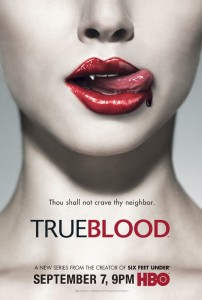
A recent article in religion dispatches, “True Blood: When Marketing Goes For the Jugular,” by Joseph Laycock, author of Vampires Today: The Truth About Modern Vampires (Praeger, 2009), describes an interesting scenario where the lines between horror fiction and popular culture were blurred, and for some, obliterated.
Laycock discusses the hit HBO series True Blood, “a soap opera featuring psychics, vampires, and shape-shifters based on The Southern Vampire Mysteries series by Charlaine Harris.” As a part of the marketing for the program the CampFire NYC agency created websites which advertised TruBlood, presented as a real blood beverage for purchase and consumption by apparently real vampires. The drink was also promoted through vampire profiles on various social networking sites as well as YouTube clips. Later HBO ramped up their marketing through such techniques with the creation of the BloodCopy blog, through which various products are promoted for sale to vampires.
Laycock reports that the public response to this marketing campaign was not always positive. In fact, many reacted negatively, expressing the sentiment that “the viral marketing campaign had ‘crossed a line.'”
Readers are directed to Laycock’s article for his brief consideration of some of the issues and ethics involved in this marketing campaign. Attention will also be profitably drawn to consideration of the reality of subcultures such as the vampire community which have been described by scholars such as Christopher Partridge as being part of a “popular occulture,” which “includes those often hidden, rejected and oppositional beliefs and practices associated with esotericism, theosophy, mysticism, New Age, Paganism, and a range of other subcultural beliefs and practices.” Popular occulture often draws upon aspects of popular culture in the form of literature, film, and television as a source of inspiration for its worldview. In addition, Michael Barkun has referred to what he has called “fact-fiction reversals,” wherein an “artifact intended as fiction, has, within a particular occultural milieu, been decoded as fact.”
Apparently in our media saturated and filtered age, fact-fiction reversals take place in more “mainstream” culture and not simply within the occultural milieu. This, and other factors, likely contributed to the scenario which gave rise to concerns over HBO’s marketing strategy in regards to True Blood.





There are no responses yet